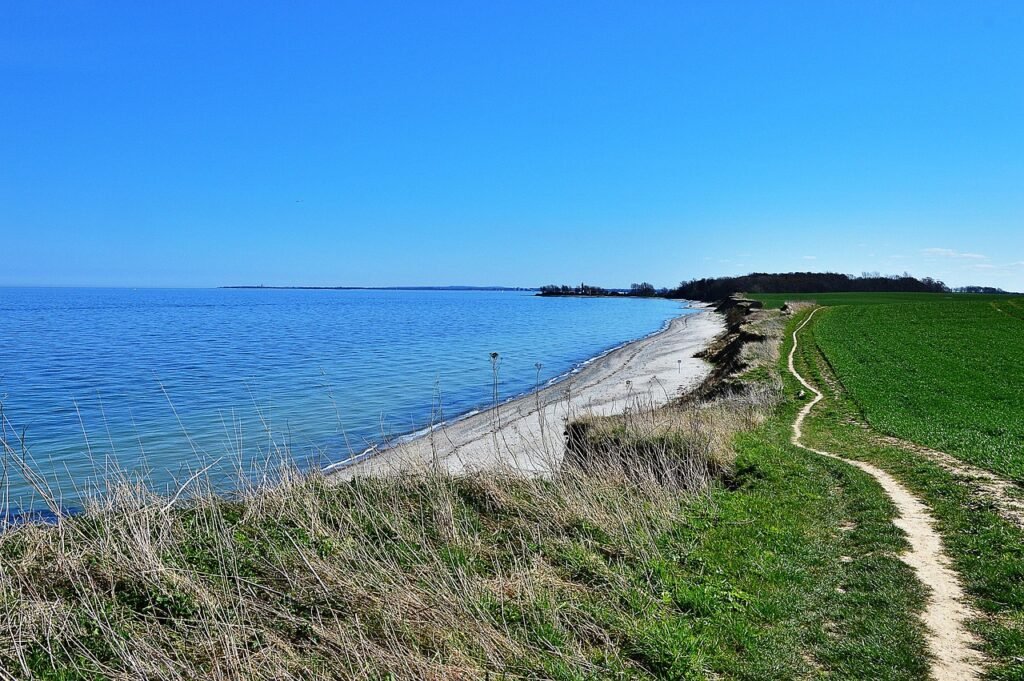Sun, sand, and surf – is there anything more synonymous with relaxation and escape? Beaches offer a diverse array of experiences, from tranquil retreats for solitude seekers to vibrant hubs for families and adventurers. This comprehensive guide explores the multifaceted appeal of beaches, covering everything from their health benefits and ecological significance to practical tips for planning the perfect beach getaway. So, grab your sunscreen and get ready to dive into the wonderful world of beaches!
The Allure of the Beach: More Than Just Sand
Beaches hold a unique place in our hearts and minds. They represent freedom, relaxation, and a connection to nature. But the appeal goes far beyond just aesthetic beauty. There’s a powerful physiological and psychological draw that makes beaches so irresistible.
Health Benefits: A Natural Remedy
Spending time at the beach can significantly improve your physical and mental well-being.
- Vitamin D Boost: Sunlight exposure helps your body produce Vitamin D, essential for bone health, immune function, and mood regulation.
- Stress Reduction: The sound of waves, the feel of sand, and the vastness of the ocean have a calming effect, reducing stress hormones like cortisol. A study published in the Journal of Environmental Psychology found that coastal environments are associated with lower levels of psychological distress.
- Improved Sleep: Fresh air and physical activity at the beach can contribute to better sleep quality.
- Natural Exfoliation: Sand acts as a natural exfoliant, removing dead skin cells and leaving your skin feeling smoother.
- Exercise Opportunities: Beaches offer a variety of opportunities for physical activity, such as swimming, surfing, beach volleyball, and simply walking or jogging along the shore.
Psychological Benefits: A Mental Reset
Beyond the physical perks, beaches offer a wealth of psychological benefits.
- Mindfulness and Presence: The simplicity and beauty of the beach encourage you to be present in the moment, fostering mindfulness.
- Creative Inspiration: The expansive view and soothing sounds can spark creativity and provide a new perspective on life.
- Sense of Awe: Witnessing the power and beauty of the ocean can instill a sense of awe, which has been linked to increased happiness and well-being.
- Social Connection: Beaches are great places to connect with friends and family, creating lasting memories.
Exploring Different Types of Beaches
Not all beaches are created equal. They vary dramatically in terms of sand type, water temperature, wave action, and overall atmosphere. Understanding these differences can help you choose the perfect beach for your needs.
Sandy Beaches: Classic Coastal Comfort
These are the beaches most people picture when they think of a beach vacation.
- White Sand Beaches: Often found in tropical regions, white sand beaches are composed of finely ground coral and shell fragments, reflecting sunlight and keeping the sand cool. Example: Grace Bay, Turks and Caicos.
- Golden Sand Beaches: More common in temperate climates, golden sand beaches are composed of minerals like quartz and feldspar. Example: Myrtle Beach, South Carolina.
- Black Sand Beaches: Formed from volcanic rock, black sand beaches are striking and unique. Example: Punalu’u Black Sand Beach, Hawaii.
Rocky Beaches: Rugged Beauty
Rocky beaches offer a different kind of coastal experience, often characterized by dramatic cliffs, tide pools, and abundant marine life.
- Tide Pooling: Rocky beaches are ideal for exploring tide pools, miniature ecosystems teeming with small fish, crabs, and other marine creatures.
- Hiking and Scrambling: Many rocky beaches offer opportunities for hiking and scrambling along the coastline.
- Photography: The rugged beauty of rocky beaches provides stunning photographic opportunities.
Pebble Beaches: A Unique Sensory Experience
Pebble beaches are covered in smooth, rounded stones rather than sand.
- Unique Sound: The sound of waves washing over pebbles is a distinctive and soothing auditory experience.
- Less Crowded: Pebble beaches are often less crowded than sandy beaches.
- Beachcombing: Pebble beaches can be great for beachcombing, offering a chance to find unique stones and shells.
Beach Activities for Everyone
The possibilities for fun and recreation at the beach are endless. Whether you’re seeking adventure, relaxation, or social interaction, there’s something for everyone.
Water Sports: Adrenaline and Adventure
- Surfing: Riding the waves is a classic beach activity that requires skill, balance, and a love of the ocean.
- Swimming: A refreshing and invigorating way to cool off and get some exercise.
- Snorkeling and Scuba Diving: Explore the underwater world and discover colorful coral reefs, exotic fish, and other marine life. Popular snorkeling locations include the Great Barrier Reef in Australia and the Caribbean Islands.
- Kayaking and Paddleboarding: A great way to explore the coastline at your own pace.
- Windsurfing and Kitesurfing: Harness the power of the wind to glide across the water.
Land-Based Activities: Relaxation and Recreation
- Sunbathing: Relax and soak up the sun’s rays. Remember to wear sunscreen!
- Beach Volleyball: A fun and social activity for all ages.
- Building Sandcastles: A classic beach pastime that encourages creativity and imagination.
- Beachcombing: Search for shells, sea glass, and other treasures washed ashore.
- Picnics and Barbecues: Enjoy a meal with family and friends by the sea.
Protecting Our Beaches: Environmental Stewardship
Beaches are fragile ecosystems that are vulnerable to pollution, erosion, and climate change. It’s our responsibility to protect these precious resources for future generations.
Reducing Plastic Pollution: A Critical Step
Plastic pollution is a major threat to marine life and beach ecosystems.
- Bring Your Own Reusable Bags, Bottles, and Utensils: Reduce your reliance on single-use plastics.
- Participate in Beach Cleanups: Volunteer your time to help remove trash from beaches. Organizations like the Surfrider Foundation host regular beach cleanups.
- Support Sustainable Businesses: Choose businesses that prioritize environmental responsibility.
- Properly Dispose of Waste: Ensure that all trash is disposed of properly in designated bins.
Conserving Water and Energy: Minimizing Our Impact
Even seemingly small actions can have a positive impact.
- Use Water Wisely: Conserve water when showering or washing dishes.
- Turn Off Lights and Electronics: Reduce energy consumption in hotels and rental properties.
- Choose Eco-Friendly Sunscreen: Opt for mineral-based sunscreens that are less harmful to coral reefs.
Supporting Conservation Efforts: Making a Difference
- Donate to Environmental Organizations: Support organizations that are working to protect beaches and marine environments.
- Educate Yourself and Others: Learn about the challenges facing our beaches and share your knowledge with others.
- Advocate for Policy Changes: Support policies that promote environmental protection.
Planning Your Perfect Beach Getaway
A little planning can go a long way in ensuring a successful and enjoyable beach vacation.
Choosing the Right Destination: Consider Your Preferences
- Budget: Beach vacations can range from budget-friendly camping trips to luxurious resort stays.
- Interests: Consider what activities you enjoy most, such as surfing, swimming, sunbathing, or exploring tide pools.
- Time of Year: Research the best time to visit your chosen destination based on weather conditions and crowd levels.
- Accessibility: Ensure that the beach is accessible to all members of your group, including those with disabilities.
Packing Essentials: Be Prepared
- Sunscreen: Protect your skin from harmful UV rays. Choose a broad-spectrum sunscreen with an SPF of 30 or higher.
- Swimsuit: Essential for swimming and sunbathing.
- Towel: A quick-drying microfiber towel is lightweight and practical.
- Sunglasses and Hat: Protect your eyes and face from the sun.
- Beach Shoes: Protect your feet from hot sand and sharp rocks.
- Reusable Water Bottle: Stay hydrated throughout the day.
- Beach Bag: Carry all your essentials in a convenient and stylish beach bag.
Safety First: Stay Aware
- Check the Weather Forecast: Be aware of potential hazards such as storms, high tides, and strong currents.
- Swim in Designated Areas: Only swim in areas that are supervised by lifeguards.
- Be Aware of Rip Currents: Learn how to identify and escape rip currents.
- Stay Hydrated: Drink plenty of water to avoid dehydration.
- Protect Yourself from the Sun: Apply sunscreen regularly, wear a hat and sunglasses, and seek shade during the hottest part of the day.
- Be Mindful of Wildlife: Respect marine life and avoid disturbing their habitat.
Conclusion
Beaches are more than just beautiful landscapes; they are vital ecosystems that offer a wealth of benefits for our physical and mental well-being. By understanding the different types of beaches, engaging in responsible activities, and protecting these precious resources, we can ensure that future generations will continue to enjoy the magic of the shoreline. So, plan your next beach adventure, embrace the sun, sand, and sea, and contribute to the preservation of these natural wonders.

